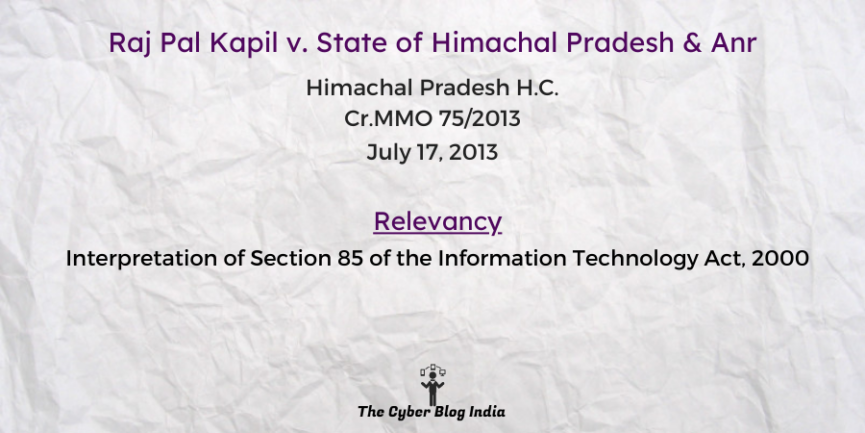Raj Pal Kapil v. State of Himachal Pradesh

Raj Pal Kapil v. State of Himachal Pradesh & Anr
(2014) 133 AIC 671
In the High Court of Himachal Pradesh
Cr.MMO 75/2013
Before Justice Surinder Singh
Decided on July 17, 2013
Relevancy of the case: Interpretation of Section 85 of the Information Technology Act, 2000
Statutes and Provisions Involved
- The Information Technology Act, 2000 (Section 85)
- The Constitution of India, 1950 (Article 227)
- The Code of Criminal Procedure, 1973 (Section 156(3), 482)
- The Negotiable Instruments Act, 1881 (Section 138, 141)
- The Indian Penal Code, 1860 (Section 419, 420, 511)
Relevant Facts of the Case
- The petitioner is an employee of Strain Brain. He received three lakh rupees from respondents to provide them with a job abroad and arrange their passports.
- The petitioner failed in fulfilling his promise. Therefore, respondents demanded the money back.
- The petitioner issued three cheques in the capacity of the authorised signatory of Swiftron Courier and Cargo Ltd. Cheques got dishonoured due to insufficient funds in the account.
- Respondents filed a complaint under Section 138 of the Negotiable Instruments Act, 1881 against the petitioner without making the company an accused. The court issued a summon order to the petitioner. They also filed a first information report on the ground of cheating.
- The present petition seeks to quash the complaint.
Opinion of the Ben
- The court relied on Aneeta Hada v. Godfather Travels and Tours Private Limited to interpret Section 141 of the Negotiable Instruments Act, 1881. In the absence of a legal bar, it is necessary to make the company an accused for prosecuting the petitioner.
- The same interpretation applies to Section 85 of The Negotiable Instruments Act, 1881.
- The court quashed the complaint, summons order and pending applications.
Final Decision
- The court allowed the petition and quashed the complaint, summons order, and pending applications.
